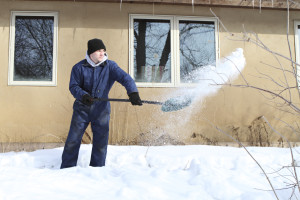 Freezing temperatures have arrived again.
Freezing temperatures have arrived again.
With freezing temperatures comes ice and snow. Ice and snow make for dangerous walking conditions.
Many of us will slip and fall. Some will suffer injuries.
It’s a reality of Canadian winters.
It’s also a reality that our laws require property owners to take reasonable care to ensure that their premises are reasonably safe. That includes taking steps to counter the reality of Canadian winters by removing snow and ice.
Does that mean that anyone slipping and falling on someone else’s property has a claim for compensation for losses arising from injuries sustained?
No, it doesn’t.
Property owners are not held to a standard of perfection. They are not required to eliminate any chance of ice or snow accumulating.
In our climate, that would be prohibitively costly. Snow can accumulate very rapidly. Ice can form within minutes at the right temperature. If property owners were held to that exacting standard, there would have to be snow removal equipment and ice melting compounds on immediate standby at every business, and along every sidewalk, street and highway, 24 hours a day.
It is not a standard of perfection the law requires, it is standard of reasonableness.
That, of course, begs the question of what is reasonable. As a property owner, what precautions must be put in place to protect the public?
Sorry about this, but my answer is, it depends.
In a case I just settled, the property owner had hired a contractor to remove snow, but seemed to have taken no precautions to deal with ice. The insurance companies recognized that insufficient care had been taken and paid fair dollars.
Ice and snow conditions must be monitored, but not constantly. There need not be a full time staff member patrolling a parking lot 24 hours a day. Perhaps it might be reasonable to task a staff member to check conditions first thing in the morning, with the frequency of follow-up monitoring depending on the forecast.
If the staff member becomes aware of a dangerous situation, immediate steps should be taken to remove the danger. Have a bag of ice melting compound readily available to attack icy patches as they are discovered.
If a danger arises even though reasonable steps have been taken to prevent it, and you are injured, the property owner will not be held accountable. If you show up at a business a half hour before it opens, before staff arrives to discover and eliminate ice, and you slip and fall, you may be without recourse.
On the other hand, the court may find that the property owner should have anticipated customers arriving early and should have sent staff ahead of time to ensure customers a safe arrival.
Most people seem to be reasonably familiar with the legal duty on property owners to make their premises safe. It is the other legal duty that many people are not so clear about: the legal duty on the public to take reasonable care for their own safety.
As a well seasoned Canadian, you should expect that you may encounter icy surfaces during the winter months. You should expect that ice and snow will accumulate even though property owners are taking reasonable steps to guard against it.
What does it mean to take reasonable care for your own safety?
You should wear footwear that is suitable for the winter conditions. You should be on the lookout for slippery surfaces. If there is any chance of ice, you should walk carefully. If you see a patch of ice, you should avoid it by walking around it.
Fail to take those reasonable steps and the law will find that you were partially at fault for your injuries. Even if the property owner is found to have failed to take reasonable steps to guard against slippery surfaces, the property owner’s insurance company may be able to avoid paying a percentage of your claim if you are found partially at fault.
In one case, a pedestrian was found 35 per cent at fault for her injuries, resulting in a 35 per cent reduction of her compensation, because on coming to a section of sidewalk that she could see was treacherously slippery, she chose to try to make it across instead of walking around it.
It’s the season for slip and fall injuries.
Let’s all of us, property owners and pedestrians alike, take reasonable care to ensure that we make it through the season unscathed. I don’t need the extra business.
Published November 21, 2010 in the Kelowna Capital News

0 Comments